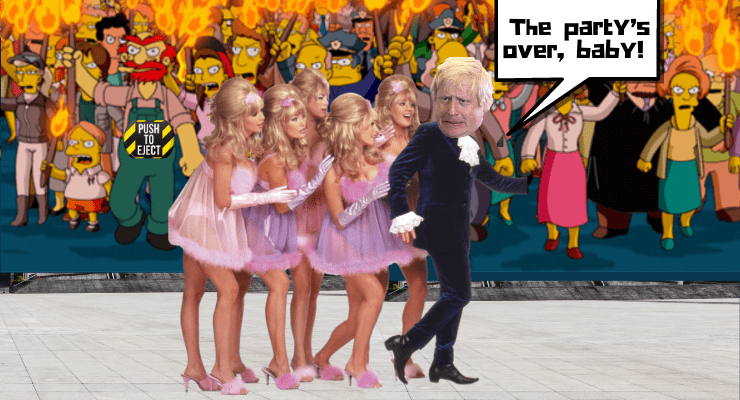
Boris Johnson is in diabolical — probably terminal — trouble after media reports, confirmed by No. 10, that his wife held a birthday party for him in 2020 during lockdown. He is denying reports that the party continued in his private flat later.
It’s yet another — by one count the 15th — Downing St party to have been held in breach of Johnson’s own COVID restrictions since the pandemic started, but the first time one has been acknowledged without an accompanying excuse by his office.
The position of the British prime minister — and serial liar — was already shaky ahead of the release of an independent inquiry into the apparently constant partying in his offices during lockdown, supposedly later this week.
Former Conservative party chair Baroness Sayeeda Warsi has called on Johnson to go, joining former senior minister David Davis and a growing list of Tory MPs, with open conflict between a decreasing group of pro-Johnson ministers and MPs who are enduring the wrath of the electorate over the hypocrisy of Johnson and his team.
The suggestion now is the only things that will save Johnson are a Russian invasion of Ukraine or the lack of a standout challenger for the job.
Johnson has long found political and personal success by cultivating the impression the rules don’t apply to him — an inveterate liar from his university days, a serial philanderer with an unclear but large number of children, a media figure who played politics as just another version of the celebrity game rather than a contest of public policy, a man whose lying could always be dismissed as the part of his public schoolboy charm.
Johnson doesn’t take himself seriously — why should anyone else, was the implication, even as he undermined prime minister after prime minister on his way to No. 10.
And yet gravity does finally seem to be sucking him back down to the political reality most other politicians exist in — and as with an overstretched rubber band, the fall has been very rapid.
One of the things accelerating it is that Johnson stands for nothing; any loyalty or following within his party and cabinet is purely personal and self-interested, not based on matters of greater substance like ideology, perceived competence or political smarts. For Johnson, there has never been any there- there — even his embrace of Brexit was purely opportunism — and the lack of substance will make the task of disposing of him all the easier.
The parallels between Johnson and Scott Morrison — the constant lying, the lack of substance, the careful curation of a confected personality, the routine incompetence, the rejection of any accountability — have always been uncanny, although in comparison with the Australian, Johnson at least has some basic education and some convictions around climate change.
The same risks that have ensnared Johnson also lie in wait for Morrison: Morrison is approaching the same kind of political territory as Johnson, where one more major mistake or significant lie could bring the whole show undone; he lacks any substance of the kind that might give his colleagues pause before disposing of him once the stench of political death sets in; loyalty to him is purely a matter of self-interest and convenience for his colleagues.
The big difference is that the Tories have a couple of years before facing the polls; the Liberals have less than four months. All the more reason why, if the end comes, it will come quickly, a house of lies collapsing in a political storm.








Crikey is committed to hosting lively discussions. Help us keep the conversation useful, interesting and welcoming. We aim to publish comments quickly in the interest of promoting robust conversation, but we’re a small team and we deploy filters to protect against legal risk. Occasionally your comment may be held up while we review, but we’re working as fast as we can to keep the conversation rolling.
The Crikey comment section is members-only content. Please subscribe to leave a comment.
The Crikey comment section is members-only content. Please login to leave a comment.